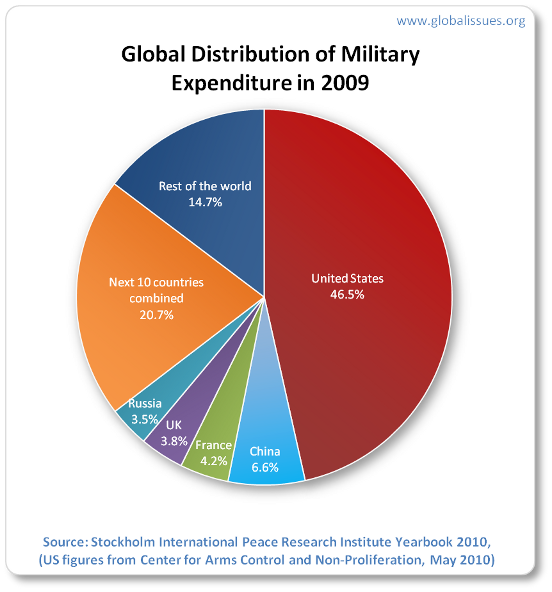The problem is that in making the case that domestic entitlements are the real cause of the deficit, the trio pulls a bit of apples-and-oranges sleight of hand. Here's the offending bit:
Defense spending has increased at a much lower rate than domestic spending in recent years and is not the cause of soaring deficits. Even as the United States has fought two wars, the core defense budget has increased by approximately $220 billion since 2001, about a tenth as much as the government devotes each year to "mandatory" spending: Social Security, Medicare, Medicaid, lesser entitlements such as food stamps and cash assistance, and interest payments on the debt. These expenditures continue automatically, year after year, without congressional debate.
The comparison here is confusing to the point of misleading. The Trio (as I'll refer to the collective) has to make it seem as though the defense budget is somehow relatively anemic so they compare just the increases in defense spending to the total yearly budgets of the entitlement programs. That's a comparison that makes no sense.*
*And without footnotes, it's hard to be sure what comparison they're making, but it's worth noting that the "core defense budget" has generally not included Afghanistan and Iraq war expenses, which have largely been appropriated through supplemental bills.
It's not easy to track down easy-for-a-layman-such-as-myself-to-understand budget information over time; the best I can find is this Congressional Budget Office table (PDF). What it shows:
* Defense spending more than doubled between 2001 and 2009 -- from $306 billion to $655 billion. (Best I can interpret the CBO data, this includes war-fighting expenses.)The defense budget as a share of GDP rose from 3 percent to 4.6 percent.
* "Mandatory" spending -- including entitlements like Social Security, Medicare, Medicaid, etc. -- also doubled during this time, from $1.007 trillion to $2.093 trillion. As a collective group, the percentage of the GDP rose from 9.9 percent of GDP to 14.7 percent. That sounds much bigger, but when you break it down by program, you see the increases are generally in line with the Pentagon's: Social Security's share of GDP rose by just 0.6 percent; Medicare rose by 1.2 percent of the GDP; Medicaid rose by 0.5 percent of GDP.
Now you can argue that the costs of those entitlements is still going to prove a drag, and I won't try to counter-argue in this post. But it's clear that -- despite the picture painted by The Trio -- Pentagon spending has been growing, along with the rest of government over the last decade, in robust fashion. It might not be the source of America's deficit issues, but it is certainly a source.
Plus, there's always this chart:
The United States spends 46.5 percent of the world's total military spending. The next closest competitor, China, spends 6.6 percent.
Now, depending on your vision of America's role in the world, maybe that's entirely appropriate. (I'm ... dubious.) Our military bestrides the world; China, at this point, seems to want to dominate the Pacific. What that chart suggests, however, is that the American defense establishment is hardly underresourced. Let's figure out the proper balance of America's defense needs and America's resources and go from there.


1 comment:
Check out this site for some good tools to graph government spending.
http://www.usgovernmentspending.com/charts
There is a companion site for government revenue.
http://www.usgovernmentrevenue.com/charts.html
Post a Comment